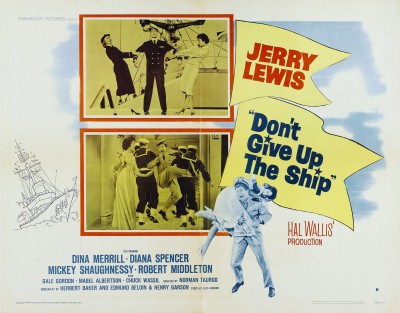| Reviews & Columns |
|
Reviews DVD TV on DVD Blu-ray 4K UHD International DVDs In Theaters Reviews by Studio Video Games Features Collector Series DVDs Easter Egg Database Interviews DVD Talk Radio Feature Articles Columns Anime Talk DVD Savant Horror DVDs The M.O.D. Squad Art House HD Talk Silent DVD
|
DVD Talk Forum |
|
|
| Resources |
|
DVD Price Search Customer Service #'s RCE Info Links |
|
Columns
|
|
|
Don't Give Up the Ship
But the movie is a strange step backward for the comedian, whose popularity was peaking around this time. After splitting with partner Dean Martin in 1956, Lewis began his solo phase with The Delicate Delinquent (1957), with Darren McGavin stepping into the role originally intended for Dean. The Sad Sack (1957) was a routine army comedy filmed in standard black-and-white widescreen, but Lewis's next films, Rock-A-Bye Baby and The Geisha Boy (both 1958) were handsomely produced color productions in VistaVision. The great Frank Tashlin, something of a mentor to Lewis, co-wrote and directed those, the former also (very) loosely based on Preston Sturges's The Miracle of Morgan's Creek.
Few remember that at this point in his career, Jerry Lewis had conquered the entertainment world as very few have before or since. He was among the highest paid and most popular stars in the movies, on television, and in live engagements. He had several hit records and even his own comic book series. The same year he made Don't Give Up the Ship, Lewis signed an unprecedented $10 million, seven-year contract with Paramount Pictures that guaranteed him 60% of the profits and the freedom to develop his own movies.
So why is Don't Give Up the Ship so bad? Simple - he owed producer Hal B. Wallis two final movies under an older, preexisting contract. (The other was Visit to a Small Planet, made the following year.) Wallis didn't care if Don't Give Up the Ship was any good; he wanted it made as cheaply and quickly as possible to reap the biggest possible rewards. And in one sense he was right: It couldn't have cost more than $750,000 to make, yet earned $3.5 million in rentals in the U.S. and Canada alone.
Some years after World War II, a $4 billion appropriation bill for the U.S. Navy is at stake when Congressman Mandeville (Gale Gordon, uncharacteristically subdued) threatens to cut funding over a mislaid destroyer escort, the USS Kornblatt. Missing since V-J Day, the vessel was last assigned to Lt. John Paul Steckler VIII (Jerry Lewis), who on his wedding day is ordered to locate and return the Kornblatt or face criminal charges.
While his bride, Prudence (Diana Spencer), anxiously awaits his return, Steckler is assigned to locate the missing ship with help from intelligence officer Ensign Benson (Dina Merrill). She employs hypnosis to jar Steckler's memory, and the middle-third of the picture is told in flashback, before returning to the present for a climatic (if that's the word) hearing over the missing ship's whereabouts.
Don't Give Up the Ship is pretty dreary. Posters for the film promised a rollicking Navy comedy, but the lion's share of the film takes place in drab Navy conference rooms and offices. The basic set-up - Jerry/Steckler loses an entire escort-destroyer and has to find it somehow - takes forever to get started: more than 30 minutes of mostly static dialogue, one-third its running time, pass before anything happens. So misguided is the screenplay that Steckler is blamed for losing a ship he didn't lose, wasn't around when others lost it, the movie audience never sees it being lost, and the happy ending is the great relief that an appropriation bill will pass. That's entertainment?
The middle third is told in flashback, with Steckler taking command of the Kornblatt when all his senior officers are abruptly discharged. But instead of audiences finally getting to see Jerry clowning aboard a Naval vessel, almost immediately he's alone, off the ship, and stranded on an island, the prisoner of Japanese soldiers who don't realize the war is over. Then, just as quickly, it's back to the present for more fitful comic situations seemingly tossed in at random: Prudence briefly suspects that her husband has been unfaithful, Steckler and Benson visit a wrestling match, Steckler and an old navy buddy (Mickey Shaughnessy) go diving in search of the Kornblatt and encounter an octopus, etc.
Jerry's slapstick provides the only relief, modest though it is. Near the beginning there's a pretty wonderful bit involving a piece of wedding cake Jerry tries to extract from a gentleman's top hat. His expressions of confusion, embarrassment, etc. are all reasonably funny, and what's onscreen suggests Lewis was really trying to wring what little comic potential existed in every scene. He's not to blame for the movie's many failings.
Video & Audio
Unlike Rock-A-Bye Baby and The Geisha Boy, mostly gorgeously Blu-rays from VistaVision film elements, Don't Give Up the Ship was shot in spherical wide screen and in black-in-white, yet still looks pretty impressive, with sharp-as-a-tack detail. Curiously, the opening titles exhibit a strange defect I've never seen elsewhere, a bit of warping when one title card cuts to the next. The mono audio, English only, is fine, and the disc is Region A encoded. No Extras.
Parting Thoughts
Jerry Lewis is all there is to Don't Give Up the Ship, and therefore for Lewis completists only. Rent It.
Stuart Galbraith IV is the Kyoto-based film historian largely absent from reviewing these days while he restores a 200-year-old Japanese farmhouse.
|
| Popular Reviews |
| Sponsored Links |
|
|
| Sponsored Links |
|
|
| Release List | Reviews | Shop | Newsletter | Forum | DVD Giveaways | Blu-Ray | Advertise |
|
Copyright 2024 DVDTalk.com All Rights Reserved. Legal Info, Privacy Policy, Terms of Use,
Manage Preferences,
Your Privacy Choices | |||||||
















